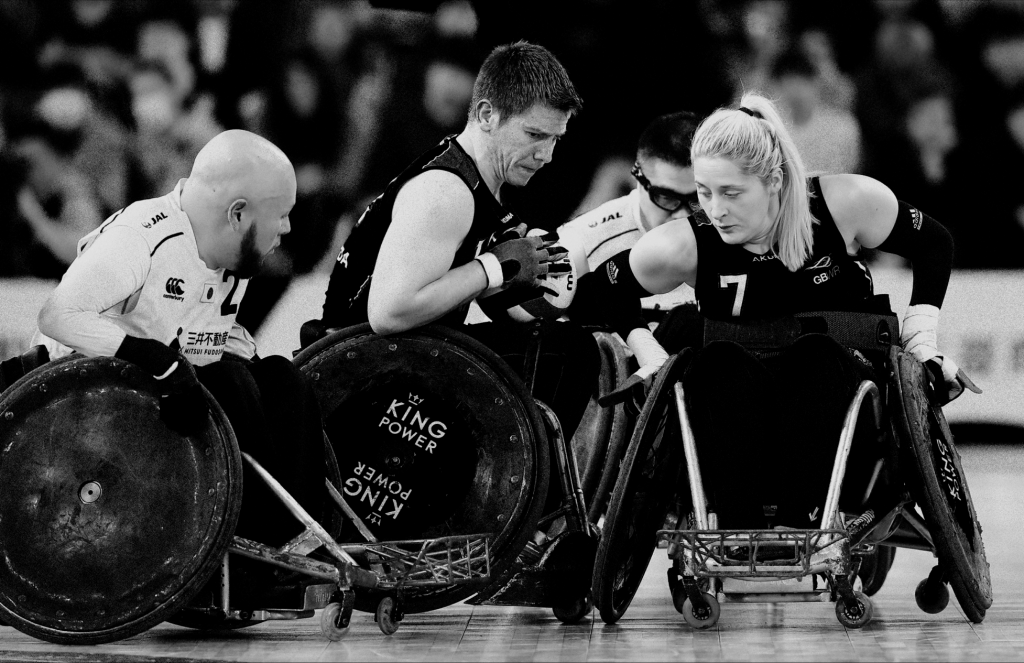About Wheelchair Rugby
Wheelchair Rugby is a mixed team sport for male and female quadriplegic athletes. A unique sport created by athletes with a disability, it combines elements of rugby, basketball and handball.

Players compete in teams of four to carry the ball across the opposing team’s goal line. Contact between wheelchairs is permitted, and is in fact an integral part of the sport as players use their chairs to block and hold opponents.
Wheelchair Rugby players compete in manual wheelchairs specifically designed for the sport. Players must meet minimum disability criteria and be classifiable under the sport classification rules. Wheelchair Rugby is a Paralympic sport, with twenty-six countries competing in international competition and more than ten others developing national programs.
History of Wheelchair Rugby
Wheelchair Rugby was invented in 1977 in Winnipeg, Canada by a group of quadriplegic athletes who were looking for an alternative to wheelchair basketball. They wanted a sport which would allow players with reduced arm and hand function to participate equally. The sport they created, originally called Murderball, is now known as Wheelchair Rugby.
The sport first appeared outside of Canada in 1979, at a demonstration at Southwest State University in Minnesota. The first Canadian National Championship was held that same year. The first team in the United States was formed in 1981, and the first international tournament, bringing together teams from the United States and Canada, was held in 1982. Throughout the 1980’s, other local and national tournaments took place in various countries. The first international tournament with a team from outside North America was held in 1989 in Toronto, Canada. With teams from Canada, Great Britain and the United States, this was a breakthrough for developing international competition and cooperation. In 1990, Wheelchair Rugby appeared at the World Wheelchair Games as an exhibition event, which helped fuel the sports rapid growth and popularity internationally.
In 1993 with 15 countries actively participating, wheelchair rugby was recognized as an official sport for athletes with a disability, and the International Wheelchair Rugby Federation (IWRF) was established as a sport section of the International Stoke Mandeville Wheelchair Sports Federation. That same year seven countries participated at the Stoke Mandeville International World Wheelchair Games.


In 1994, Wheelchair Rugby was officially recognized by the International Paralympic Committee (IPC) as a Paralympic sport. The first Wheelchair Rugby World Championships were held the following year in Nottwil, Switzerland with eight teams competing. In 1996 Wheelchair Rugby was included as a demonstration sport in the Atlanta Paralympic Games with 6 countries competing. In 1998, Toronto, Canada hosted the second IWRF Wheelchair Rugby World Championship, and 12 countries attended.
Wheelchair Rugby was recognized as a full medal sport for the first time at the 2000 Paralympic Games in Sydney, Australia. It has since been featured at the Paralympic Games in Athens in 2004, Beijing in 2008, and is included in the competition program for the 2012 Paralympic Games in London. World Championships and the Paralympics are held every 4 years.
Currently, there are more than forty countries that actively participate in the sport of wheelchair rugby, or who are developing programs within their nation. The IWRF (WWR?) includes three zones: The Americas, with six active countries; Europe, with fourteen active countries; and Asia-Oceania, with six active countries.
Who can play?
To be eligible to play Wheelchair Rugby, individuals must have a disability which affects the arms and legs. Most players have spinal cord injuries with full or partial paralysis of the legs and partial paralysis of the arms. Other disability groups who play include cerebral palsy, muscular dystrophy, amputations, polio, and other neurological conditions. Men and women compete on the same teams and in the same competitions.
Players are assigned a sport classification based on their level of disability; teams must field players with a mix of classification values, allowing players with different functional abilities to compete together.
What equipment is needed?
Athletes compete in manual wheelchairs that are specifically built for the sport. The rules include detailed specifications for wheelchairs to ensure safety and fairness. In international competition, all wheelchairs must meet these requirements.
To begin playing, any manual wheelchair may be used, although the game is easier when played in a lightweight sports wheelchair such as a wheelchair basketball chair.
The game is played with a white ball, similar to a volleyball. Four cones, pylons, or markers are used to mark the goal lines. A game clock is also required; any clock used for basketball, handball, or other similar sports will be sufficient.
What facilities are required?
Wheelchair Rugby is played indoors on a regulation sized basketball court. Hardwood is the preferred surface, although other surfaces are acceptable. The playing surface must be accessible to people in wheelchairs. Any facility used for wheelchair basketball can also be used for Wheelchair Rugby.
